21 Dec 18 | Croatia, Hungary, Macedonia, Media Freedom, media freedom featured, Montenegro, News and features, Poland, Serbia
[vc_row][vc_column][vc_single_image image=”104453″ img_size=”full” add_caption=”yes”][vc_column_text]Additional reporting by Ada Borowicz, Ilcho Cvetanoski, Lazara Marinković and Zoltán Sipos
Unpatriotic behaviour. Sedition. Being in the pay of shadowy external forces. Faking a neo-Nazi event. These are just a few of the charges that have recently been levelled against independent journalists by pro-government media outlets in several central and eastern European countries.
The opening volley in a sustained campaign of vilification directed at Serbia‘s independent media was fired by the state-owned weekly Ilustrovana Politika at the end of October, with an article that accused journalists who are critical of the government of being “traitors and collaborators with the enemies of Serbia”.
Two weeks later, Ilustrovana Politika followed up with another piece that accused the veteran journalist Ljiljana Smajlović – who has long been critical of the nationalistic legacy bequeathed on the country by its former leader Slobodan Milosević and co-founded the Commission Investigating the Murders of Journalists in Serbia – of complicity in the 1999 NATO bombing of Belgrade.
In mid-December, Ilustrovana Politika’s campaign of character assassination against Smajlović ratcheted up another level with a garish front page depicting her as a Madonna figure with two naked infants bearing the features of Veran Matić, the chairman of the commission, and US Ambassador to Serbia Kyle Scott.
Smajlović has no doubt over what lies behind this tidal wave of denigration, of which she has become the prime target.
History repeating itself?
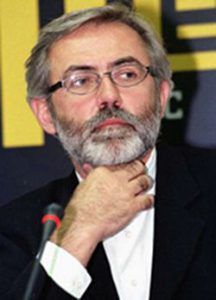
Editor Slavko Ćuruvija was murdered in 1999.
The long-running trial of four ex-members of the Serbian intelligence service accused of the murder of Dnevni Telegraf editor Slavko Ćuruvija – shot dead in April 1999 a few days after the pro-government Politika Ekspres accused him of welcoming the NATO bombardment – is now in its final stages, and Smajlović is convinced that the current campaign against her is designed to influence the judges in the case.
“The attacks come from the same Milosevic-era editors who also targeted my colleague Ćuruvija as a traitor prior to his assassination,” she told Mapping Media Freedom. “What is also sinister is that they are published and printed by the same state-owned media company that targeted Slavko nearly twenty years ago.”
“The clear implication is that I am the same kind of traitor as he was. How will that affect the judges? Will they fear this is not a good time to hold state security chiefs to account?” she added.
While Smajlović admits that Ilustrovana Politika’s denunciation has made her feel insecure, she insists she is less concerned for her own safety than worried about the consequences for the outcome of the Ćuruvija trial. Quoting Marx’s dictum that “History repeats itself, first as tragedy and then as farce”, Smajlović said. “I hope this is the farce part.”
Laying the blame
In Serbia and other central and eastern European countries, the assignment of responsibility for historic causes of resentment and the potential of these to further divide a polarised public often form the background to attacks on independent journalists by their state-approved colleagues.
The thorny topic of Poland’s relations with Germany during the last century recently gave pro-government media in Poland a chance to accuse independent media of being insufficiently patriotic and even of falsifying facts.
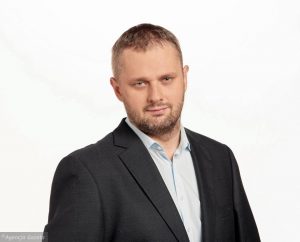
Journalist Bartosz Wieliński was targeted by the head of TVP Info’s news site.
In November, after Bartosz Wieliński, a journalist with the independent daily Gazeta Wyborcza, gave a critical account of a speech made by the Polish ambassador to Berlin at a conference devoted to the centenary of Poland’s independence, the head of the state broadcaster’s news website, TVP Info, accused him of lying and of putting the interests of Germany before those of his own country.
Only a few days before this attack, two media outlets that support Poland’s ruling national-conservative Law and Justice (PiS) party accused the independent US-owned channel TVN of fabricating the evidence on which a report about the resurgence of neo-Nazism in Poland was based.
Since it came to power in 2015, PiS – which has been accused by its critics of tolerating organisations that espouse far-right ideologies – has put pressure on independent media outlets, many of which are foreign-owned, as part of its campaign to “re-polonise” the media, and now appears to be using the public broadcaster and other tame outlets as accessories in this drive.
Willing accomplices
In Hungary, where the government led by Viktor Orbán has succeeded in imposing tight control on all but a few determinedly independent media outlets, a number of loyal publications are available for the purposes of vilification.
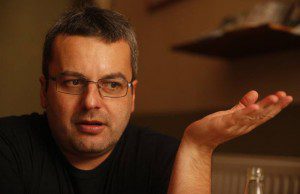
2015 Freedom of Expression Journalism Award winner Tamás Bodoky, founder of Atlatszo.hu
In September, a whole raft of pro-government media outlets vied with each other to depict Tamás Bodoky, the editor-in-chief of the investigative journalism platform Átlátszó and winner of the 2015 Index on Censorship Freedom of Expression Award for Journalism, as a “Soros hireling”. Bodoky became the target of a co-ordinated smear campaign after he posted on Facebook a picture of himself taken in Brussels with Dutch Green MEP Judith Sargentini, whose report on the Fidesz government’s infringement of core EU values had formed the basis for the European parliament’s censure motion against Hungary a few weeks earlier.
Another Hungarian journalist, András Dezső, who works for the independent news website Index.hu, also recently came under attack from pro-government media outlets after a Budapest court let him off with a reprimand over a case in which he was alleged to have made unauthorised use of personal information. In an article published before April’s general election, Dezső had cast doubt on the account of a woman who declared on Hungarian TV that she felt safer in Budapest than in Stockholm because of the lower level of immigration in Hungary. The airing of the interview by the public broadcaster was seen as providing support for Fidesz’s anti-immigration stance and aiding its election victory.
A criminal charge was issued against Dezső for “misuse of personal data”, and after he received what was described in the Hungarian media as “the mildest possible punishment”, two pro-government news websites, 888.hu and Origo.hu, accused him of deliberately propagating fake news and seeking to mislead his readers.
Why do they do it?
What motivates those journalists who smear their colleagues who seek to hold power to account?
There does not appear to be a simple answer to this question. While some may vilify fellow journalists to order purely for financial gain (or because of a desire for job security, government-sponsored media outlets generally being on a more secure financial footing than their independent counterparts), some appear to approach the task with at least a measure of conviction.
Ilcho Cvetanoski, who reports on Bosnia, Croatia, Macedonia and Montenegro for Mapping Media Freedom and has observed many smear campaigns over the years, believes that financial and ideological motivating factors are often inextricably intertwined. He points out that two decades on from the armed conflicts in the region, Balkans societies are still deeply divided along ideological and ethnic lines, and many people still find it extremely difficult to accept the right of others to see things differently. Cvetanoski notes that there are many “true believers” who are genuinely convinced that they have a duty to defend their country from the “other” – a group in which they tend to lump critical journalists along with mercenaries, spies and traitors.
Lazara Marinković, who covers Serbia for Mapping Media Freedom, believes that the main motivation there is a need to be on the winning side and to please those in power. “Often they actually enjoy doing it, either for ideological reasons or because they feel more powerful when they are on the side of the ruling party,” she told Mapping Media Freedom. Marinković noted that the majority of Serbian tabloids and TV stations that conduct smear campaigns against independent journalists are owned by businessmen who have close links to President Aleksandar Vučić’s national conservative Serbian Progressive Party (SNS). Vučić began his political career during the Milosević era, when he served as Minister of Information.
In Poland, the divisions in society and the consequent lack of tolerance in political culture have been blamed for the increasing polarisation of the media. Michal Głowacki, a professor of media studies at Warsaw University, told Mapping Media Freedom that journalists take their cue from politicians in failing to show respect for fellow journalists associated with the “other side”. “They even use the same language as politicians,” Głowacki notes.
This is a view echoed by Hungarian journalist Anita Kőműves, a colleague of Bodoky’s at Átlátszó. Kőműves, however, insists that while journalists who work for independent media outlets strive to uphold the principles of journalistic ethics, the same cannot be said of those employed by pro-government outlets. “Some of those serving the government at propaganda outlets think that the two ‘sides’ of the Hungarian media are equally biased and that they are not acting any differently from their counterparts in the independent media sphere. However, this is not true: pro-government propaganda outlets do not adhere to even the basic rules of journalism,” she told Mapping Media Freedom.[/vc_column_text][vc_raw_html]JTNDaWZyYW1lJTIwd2lkdGglM0QlMjI3MDAlMjIlMjBoZWlnaHQlM0QlMjI0MDAlMjIlMjBzcmMlM0QlMjJodHRwcyUzQSUyRiUyRm1hcHBpbmdtZWRpYWZyZWVkb20udXNoYWhpZGkuaW8lMkZ2aWV3cyUyRm1hcCUyMiUyMGZyYW1lYm9yZGVyJTNEJTIyMCUyMiUyMGFsbG93ZnVsbHNjcmVlbiUzRSUzQyUyRmlmcmFtZSUzRQ==[/vc_raw_html][vc_basic_grid post_type=”post” max_items=”4″ element_width=”6″ grid_id=”vc_gid:1545385969139-cb42990e-b3e2-3″ taxonomies=”9044″][/vc_column][/vc_row]
05 Dec 17 | Europe and Central Asia, Mapping Media Freedom, Media Freedom, media freedom featured, Montenegro, News and features
[vc_row][vc_column][vc_single_image image=”96761″ img_size=”full” alignment=”center”][vc_column_text]This article was originally published by Osservatorio Balcani e Caucaso.
Read in Italian.
Jovo Martinović is a freelance investigative journalist in Montenegro, who has worked for a number of international outlets — National Public Radio, BBC, VICE, CBS, Canal Plus, The Economist, TIME, Global Post, BIRN — and is known for his reports on organised crime in Europe and war criminals in the Balkans. His investigations brought him in close contact with persons involved in drug-trafficking as well as members of the Pink Panthers, an international network of jewellery thieves.
In October 2015, he was arrested after being charged with drug trafficking and participation in a criminal organisation. The prosecution by the Montenegrin state – as well as the long, unjustified pre-trial detention – was highly criticised by international media freedom and human rights organisations. Martinović proclaimed his innocence and – as a well-known, respected investigative journalist – could convincingly state that the contacts were part of his investigation.
Martinović was released at the beginning of 2017 after 14 months in prison, but is still on trial, facing up to ten years in prison. Francesco Martino, a correspondent for Osservatorio Balcani e Caucaso, met him in Pristina, during a conference organised by Le Courrier des Balkans.
Do you see your case as unique, or as part of a general strategy to undermine freedom of the press in Montenegro?
In Montenegro, in these last years, several cases were registered of physical attacks against journalists, and in 2013 the premises of the leading independent newspaper Vijesti were bombed. So, yes, the media and journalists have been under pressure in Montenegro. My personal case was somehow different, probably because I have always worked for the Western media. The approach taken against me was definitely unique: no other journalist in Montenegro has spent fourteen and a half months in prison. Cases like mine have been registered in countries like Russia, Turkey, and Venezuela, where last year investigative journalist Braulio Jatar was accused of money laundering and imprisoned after appearing as an opponent of Venezuelan president Nicolás Maduro.
In the past, were you ever “warned” to stop your investigations by representatives of the political power?
I was warned – to put it that way – several times in the past, when I worked in some investigations that were not particularly well-received, to say so. Sometimes, I was even suspected for reports which appeared in the foreign media that I had nothing to do with.
How were you treated during your long imprisonment?
I was treated fairly during my stay in prison. While filming a documentary film on the main defendant in my case, Dusko Martinović, I had been several times in prison to interview him, so they already knew me there. I enjoyed a fair treatment, and I didn’t receive any pressure from the prison staff while being detained.
How do you explain your incarceration? Which are the reasons for such a long time behind bars?
When I was arrested, I was working on a documentary film for the French channel Canal Plus about smuggling of weapons from the Balkans – Albania and Bosnia and Herzegovina in particular – into France, weapons that eventually ended up in the hands of terrorist groups. Back then, I was working on the Bosnian case and filming in Serbia, so our investigation wasn’t linked to Montenegro at all. I find it difficult to link it with my incarceration unless we’re speaking of pure communist paranoia on the part of someone in power. I rather believe that they used the documentary as an opportunity for pay-back for my non-compliance and “insubordination” in earlier cases.
You have always worked for international media rather than for local ones. Do you think this puts you in a more delicate position?
Yes, sure. Balkan governments are much more scared and worried about what big international media report about them than the local ones. So, working for international media puts you under a stronger pressure, because if governments or the security structures aren’t happy about the way a certain matter has been reported, the easiest way to retaliate is to put the blame on the local stringer.
What was the reaction of journalist’s organisations and the Montenegrin media to your arrest? Did you receive tangible solidarity?
Initially, local media picked the news from international organisations that wrote to the Montenegrin government on my behalf. In the beginning, the reaction was quite humble, maybe because I wasn’t really perceived as part of the Montenegro media community since, as I already stressed, I never worked for the local media. But when my incarceration was prolonged, Montenegrin independent media started to focus on my case and were very supportive. On the other hand, though, the state-controlled media basically ignored my story.
Do you think journalists and media in Montenegro are eager to support each other in defending freedom of speech in the country?
Montenegro is a small country with a small media market, so petty rivalries among journalists are quite common. Nevertheless, when it comes to serious matters like protecting media freedom, I think solidarity and mutual support prevail.
Is there any real room for investigative journalism in Montenegro? Are there concrete opportunities to denounce corruption, links between political power and organised crime, and effective channels to reach the public?
Sure, freedom of expression does exist and in these past years, some local media have done an extremely good job. There have been several good stories, scoops, which haven’t produced any big change in society yet. Of course, as in many other countries in transition, opportunities for good journalism in Montenegro are accompanied by risks and challenges. What’s worse, though, is that good investigations usually have no impact, even if they’re substantiated by facts and documents. In the Balkans, and particularly in such a small country as Montenegro, you don’t have the same public response to news criticising the government as in Western Europe. I think this is partly explained by a weaker democratic tradition.
Montenegro is currently an EU candidate state: do you think the European monitoring linked with accession negotiations is helping to improve media freedom in the country?
It’s difficult to give a clear-cut answer, but I believe the EU is generally playing a positive role. Endorsing a Western system of values in the framework of the EU accession process is relatively easy, while it’s way more challenging to actually implement those values, transforming Balkan countries into viable realms of rule-of-law.
This publication has been produced within the project European Centre for Press and Media Freedom, co-funded by the European Commission. The contents of this publication are the sole responsibility of Osservatorio Balcani e Caucaso and its partners and can in no way be taken to reflect the views of the European Union. The project’s page[/vc_column_text][/vc_column][/vc_row][vc_row][vc_column][vc_basic_grid post_type=”post” max_items=”12″ style=”load-more” items_per_page=”4″ element_width=”6″ grid_id=”vc_gid:1512410060523-0e52f5ac-262f-7″ taxonomies=”9043, 4612″][/vc_column][/vc_row]
19 Sep 16 | Europe and Central Asia, Mapping Media Freedom, Montenegro, News and features
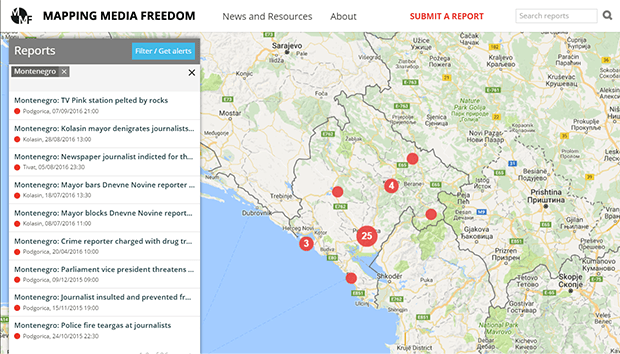
In the past two months three threats to media freedom involving the mayor of Kolasin, a town in Montenegro, have been reported to Mapping Media Freedom.
Kolasin, which is the centre of a regional municipality of about 10,000 people, has a small media market that includes just one local newspaper named Kolasin and four correspondents working for the national dailies — Pobjeda, Dan, Vijesti and Dnevne Novine. There is no local TV station. The local government is run by a coalition of opposition parties — Democratic Front, the Social Democratic Party of Montenegro (SDP) and the Socialist People’s Party of Montenegro — while the Democratic Party of Socialists is the majority party in the national parliament and it runs the Government.
|
This article is a case study drawn from the issues documented by Mapping Media Freedom, Index on Censorship’s project that monitors threats to press freedom in 42 European and neighbouring countries.
|
|
In two of the cases, the local official, Zeljka Vuksanovic, an opposition politician belonging to SDP, had intentionally not invited Zorica Bulatovic, Kolasin correspondent for the governing party-aligned daily newspaper Dnevne Novine, to press conferences. In the third case, Bulatovic reported that she was verbally harassed.
Bulatovic told MMF that she is being blocked from reporting on Kolasin’s administration as a result of her critical reporting. In a statement to MMF, the mayor said that Bulatovic’s politically motivated reporting is the reason the journalist is not being invited to press conferences. “If you read her articles you will see why I am not communicating with her. You will see that those articles are not articles written by a journalist,” Vuksanovic wrote.
According to CDM, a media outlet owned by the Greek businessman Petros Stathis, who also owns the Dnevne Novine and another daily, Pobjeda, Bulatovic was not invited to an 8 July press session organised by the municipality. The news outlet also reported that Vuksanovic forbid municipality departments from cooperating with or providing information to Bulatovic.
Ten days later, on 18 July, the reporter was the only local journalist not included in a press conference organised after the visit of the national government’s minister for human and minority rights, Suad Numanovic, who called on officials to reverse their decision regarding Bulatovic.
The third incident occurred on 28 August when, in a speech, Vuksanovic said that the local ruling coalition had succeeded in triumphing over “crime, political corruption and media sputum”. Incensed by the speech, the five reporters that were present asked the mayor for an apology and further clarification on her points. The following day, Vuksanovic addressed her reply to four of the journalists, again omitting Bulatovic.
In the response, the mayor said that the term “media sputum” was not directed to the four journalists, but to the “media sputum that is hiding behind journalism as a profession”.
“It’s clear from the incident that the ‘media sputum’ comment was in fact verbal harassment of Zorica Bulatovic,” MMF project officer Hannah Machlin said. “This type of comment only serves to undermine the press as whole.”
Bulatovic told MMF that the negative climate between herself and the mayor has been going on for two years. She said that not only is she facing closed doors at the mayor’s office, but also at the municipal administrations.
The mayor disagrees with Bulatovic’s assertions, saying that the journalist is not barred from attending press conferences. “It is true that I don’t send her invitations for the press conferences, but I have never physically banned her presence at the press center,” Vuksanovic wrote MMF in an email.
Bulatovic maintains that she is barred from entering the press center. She also said that in the five years she has been reporting for Dnevne Novine, she has not had to make any corrections to her articles.
While Bulatovic is facing daily obstacles to her reporting, the four other local journalists are in a slightly better position since they are invited to press conferences. Yet, according to her, all the journalists face a common problem: despite the 2012 freedom of information law local politicians consistently throw up obstacles to documents or sources that would put them in a negative light.
“This whole situation is enormously impacting my work because it’s impossible for me to get an official statement from the local municipality,” Bulatovic said.
(Self)censorship always happens to someone else
Marijana Camovic, a journalist and head of the Trade Union of Media of Montenegro, said that while she was not fully aware of the situation in Kolasin, she did not know of another case where a reporter has been under a constant ban from press conferences. The usual practice for Montenegrin politicians is to publicly denigrate the work of journalists who are putting them and their administrations under scrutiny.
Camovic said the issue journalists in small communities with limited news sources, like Kolasin, most often grapple with is self-censorship.
“I personally think that self-censorship is an even bigger problem than censorship, as in that circumstance journalists know what is expected from them to write,” she said.
In her experience, it is rare for a journalist to be openly censored by their editor. The union recently undertook research, which will be published in October, that amongst other things asked journalists to comment on censorship and self-censorship in Montenegro. Camovic called the preliminary results very interesting.
“Generally, journalists answer that there are self-censorship and censorship in Montenegro. But, when you asked them whether they have personally been censored or succumbed to self-censorship, then only a few of them answer positively. So the conclusion is that there are self-censorship and censorship, but it always happens to someone else, which is paradoxical in itself,” Camovic said.
Her hypothesis is that journalists are probably ashamed to admit that they adjust to the official media policy to keep their jobs. It is not a secret that media outlets are politically engaged, she said.
“They openly support one and criticise the other political option. This is done without consideration of ethics and the role of the media in the democratic society.”
13 Oct 15 | Europe and Central Asia, mobile, Montenegro, News and features
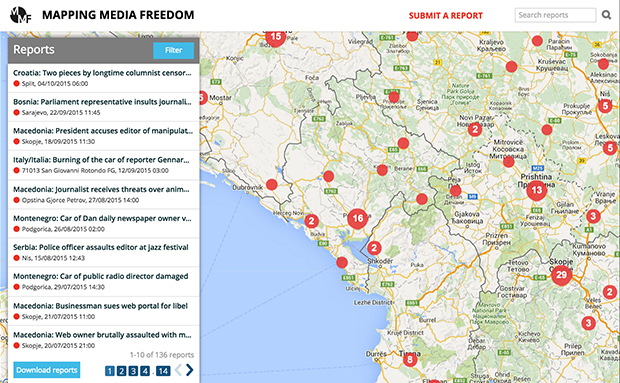
While the physical safety of Montenegro’s journalists is far from guaranteed, a more troubling trend toward using media professionals to settle professional or business scores is undermining the country’s news outlets.
Describing mass media in Montenegro, Marijana Camovic, a journalist and head of the Trade Union of Media, says the deep-rooted division between pro-government and pro-opposition media has now reached a completely new level. Television news and newspaper front pages are filled with the “dirty laundry” of journalists that work for competing outlets, she said.
As a result of the smear campaigns, more journalists are leaving the profession.
“Before, journalists would consider leaving the job only after they found a new one, but not anymore. Nowadays there are a lot of displeased and disappointed journalists who are quitting without thinking twice.”
These departures leave empty spaces that are filled by people who are willing to work for lower wages and compromise on journalistic integrity by publishing what they are told to publish. Ethical and professional journalism is becoming scarcer, according to Camovic.
Without proper media ethics and professional solidarity, journalists are often manipulated by politicians and businessmen to advance the cause of interests contrary to their own or the public’s, says Camovic. “Media workers are being used as a tool for political pressure and the elimination of other political affiliations.”
At the same time, there has been a drastic decrease in circulation, lower advertising income and growing debts for outlets. Camovic said the Montenegrin media’s catastrophic economic condition can no longer be denied.
Camovic points out that the main issues affecting media professionals are no longer impunity or physical assaults. Today, the major areas of concern include a lack of respect for media workers’ rights and falling salaries; fair remuneration for freelancers; and the rights to unionise and collective bargaining.
However, this is not to say that journalists’ safety is no longer an issue. Take, for example, the case of Tufik Softic, who has been under constant police protection since February 2014. In November 2007, Softic was brutally beaten in front of his home by two hooded assailants wielding baseball bats, and in August 2013, an explosive device was thrown into the yard of his family home. The European Federation of Journalists (EFJ) sent an open letter to Filip Vujanovic, president of Montenegro, in June this year expressing their “regret that no concrete action has been done to bring the perpetrators, who are behind these attacks, to justice”.
As Index on Censorship’s Mapping Media Freedom project highlights, the tactics of intimidation have shifted. Between February 2014 and October 2015, there were 23 verified media violations in Montenegro. Most of those incidents involved attacks on journalists’ property, with cars being a popular target.
Last year, Human Rights Action (HRA) outlined in a report that there were 30 instances of threats, violence and murder, as well as attacks on media property between May 2004 and January 2014.
“I think that everything should be changed – from the approach towards journalism to the dynamics inside the guild,” she says. But the biggest mistake, Camovic emphasises, is that journalists are taking part in the blackmailing game, which has resulted in the absolute collapse of professional standards.
Camovic points to the almost uninterrupted 24-year political rule of Milo Dukanovic, the passivity of Montenegrin society and the absence of the rule of law as contributing to the dire situation.
Mapping Media Freedom
Click on the bubbles to view reports or double-click to zoom in on specific regions. The full site can be accessed at https://mappingmediafreedom.org/
|





